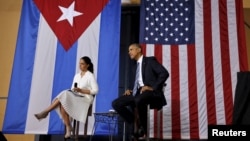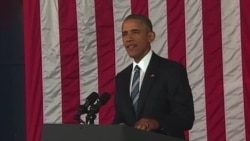Economists say improving relations between Washington and Havana are already helping Cuba’s growth, and may bring significant investment to the island.
But some experts and business executives say Cuba would grow faster if it improved its crumbling infrastructure, introduced independent courts, and made economic data more transparent.
Cuba needs economic growth to create jobs for the 1 million people cut from government payrolls since 2009. That is a significant fraction of the island’s population of around 11 million.
Susan Segal of the Americas Society and Council of the Americas writes that entrepreneurship, which often includes very small companies, has been a key to creating jobs in many parts of Latin America, including Cuba. Improving the business climate is a step toward creating jobs.
WATCH: US President Obama speaks to entrepreneurs in Havana
Analysts say continued economic reforms in Cuba and improving relations with the United States support the economy and raise the likelihood that U.S. economic sanctions might be eased further.
Moody’s rating agency has raised its prediction of Cuban economic growth slightly, to 3 percent this year. That change is based partly on a surge in U.S. visitors to Cuba.
Moody’s has also improved its assessment of Cuba’s credit, but Moody's Vice President Jaime Reusche told VOA that the nation’s bonds are still “very speculative” and carry a lot of risk. But they could offer high returns.
Moody's complains that some Cuban economic data is unavailable, making an accurate assessment difficult.
Internet access
Cuban President Raul Castro said the recent thaw in U.S.-Cuban relations has already produced “concrete results,” including direct commercial flights, postal exchanges and agreements to safeguard the environment and safety at sea.
But Castro also made it clear that the U.S. trade embargo and the U.S. military base at Guantanamo are obstacles to further improvements in relations.
U.S. President Barack Obama, who has been trying to get the U.S. Congress to end the half-century-old U.S. embargo against Cuba, said the two nations have some “very serious differences,” but can still pursue more commercial ties to “create jobs and opportunity for Cubans and Americans alike.”
Obama urged Cuba to show it is “ready to do more business” by “allowing more joint ventures” and allowing foreign companies to “hire Cubans directly.”
The president applauded Cuba’s plan to end a tax on converting dollars to Cuban Convertibles (CUCs), one of two Cuban currencies, as a step to boost trade.
Obama added that President Castro has set a goal of providing Internet access to more Cubans.
At a meeting with Cuban and U.S. entrepreneurs, Obama underlined the impact that the Internet has had on fast-growing American companies. He urged one U.S. CEO to explain how the Internet helped him turn an idea into a multibillion-dollar company in a few years.
Improved Internet access is the goal of Google, which is now moving to set up Wi-Fi and broadband access on the island.
Other impediments
More U.S. businesses are opening operations in Cuba, as restrictions are eased, but not ended. Booking.com will make Cuban hotel rooms available to U.S. customers for the first time.
Airbnb, a global online service that matches travelers with homes with rooms to rent, said Cuba is the fastest-growing market in its history.
Starwood Hotels signed a deal to manage and market three hotels in Havana, and Carnival cruise lines has won approval to dock at Cuba.
While many firms are announcing expansion into Cuba, veterans of the Cuban market say problems with phones, Internet, and other infrastructure can make it a frustrating place to work. Other businesses complain they have difficulty getting raw materials and parts.
Another problem is the lack of the rule of law, according to University of Miami professor Jose Azel.
Azel said courts are subservient to the Cuban government and act arbitrarily, something that he says worries businesses and discourages the major investment needed to bolster Cuba’s economy.
Americans who want to end the embargo and bolster ties with Cuba argue that expanding economic and commercial ties will encourage change in democracy and governance on the island.
But President Castro said, "No one should intend to have the Cuban people renounce the destiny chosen in freedom and sovereignty.”
Bernard Shusman in New York contributed to this story.








